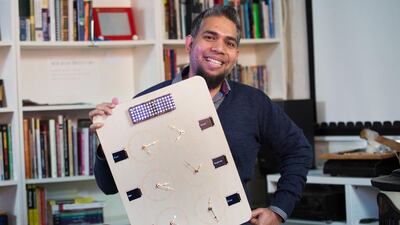It may look like a traditional clock, but behind the design, this timepiece is infused with modern technology that its designers hope will one day integrate Muslim communities and their mosques.
“Remarkable” was the word that inspired the British inventor Zahid Ali to create a prototype of a connected prayer clock that could change the way Muslims communicate in places of worship. Having spent 12 years working in the technological field, Ali and his team came up with the idea for Wafaa, a smartclock for mosques. Wafaa is a purpose-built, “connected” clock that alerts people to congregation times.
The urge to build such a clock began in Ramadan. In Muslim countries, adhan – or the call to prayer – informs worshippers that it’s time for prayers. It happens five times a day. However, it becomes more difficult in non-Muslim countries where there’s no call to prayer.
What makes this clock unique compared with the conventional ones usually found in mosques? Wafaa is equipped with three key functions, Ali explains. These include seamless synching to enable auto-updates through Wi-Fi; audio broadcasting and streaming; and “iBeacon” technology to keep track of mosque visitation trends.
A Wi-Fi connection is the most important requirement, allowing it to automatically update across different platforms, including the clock and smartphone apps.
For example, the imam updates the congregation time using the Wafaa app. The congregation usually takes place five to 25 minutes after the call to prayer. An instruction is sent to the Wafaa system in the “cloud”, which updates all Wafaa clocks in the mosques with the correct times.
Wafaa works wirelessly via smartphone or computer making it feasible for followers to stay informed about the mosque’s latest activity through instant notifications.
The inspiration for Wafaa came after hearing a lecture by the American author and marketer Seth Godin. “I was listening to his lecture about being remarkable,” says Ali, 35. “Are Muslims today remarkable enough?” was the question that left Ali pondering.
The problem many Muslims face today, he says, is that they’re not remarkable enough. “Muslims are not contributing enough to the world,” he says. “The immediate picture that comes to people’s mind when Saudi Arabia is mentioned is the oppression of women.
“People don’t have time for average inventions; people want something worthy of attention, something remarkable,” he says.
And so he began his journey, creating a smartclock he hopes will help integrate Muslim communities with their the mosques and create a modern way for them to stay connected.
Ali says his project will also encourage people to discover “hidden” mosques. Once the clock is installed, it will update regularly and alert Wafaa subscribers to the mosques in their neighbourhood.
Apart from this, Ali is working with a feature called iBeacon, which is an indoor positioning system that can record the number of visitors to a Wafaa-enabled mosque.
“The app records the visiting trends and how much time people spend in the mosque,” he says. The idea is to eventually create a social-network platform and bring different communities together. There are many prayer apps, which show the prayer time, but Wafaa will show the “jumaa” or congregation time.
“At the time of Prophet Mohammed, people would gather in the mosque and socialise,” Ali explains. Often, people would visit the Prophet and ask him religious questions. “Mosques were a meeting point, but that element is slowly dying.”
Today, he says, many Muslims visit the mosque for the sole purpose of praying, then leave once they’re done. But Ali plans to bring the prophetic practice back on track and hopes that by having the smartclock in every mosque it will improve social and communal affairs through networking.
Wafaa also has built-in audio broadcasting and streaming. “The clock has two versions: basic and advanced,” he says. The basic version comes without audio technology, while the advanced feature comes with built-in audio broadcasting and streaming. No special hardware is needed to make this functional – it automatically streams audio, such as sermons or lectures, to smartphones or computers from any Wafaa-enabled mosque in the world.
Asked about the design, he says the clocks have a seven-pointed star shape resembling Islamic design. The design also includes interchangeable multilingual labels and clear display panels of time and alerts. “We used materials such as polycarbonate and light wood, covered with veneer,” he says.
Finance is the main challenge standing between Ali and his dream of bringing Muslims closer to each other. He’s currently seeking investors to help fund the project. “We have the knowledge, resources and a great team,” he says. “Some people think that we are trying to create money out of Wafaa, which is incorrect. Getting this message across is proving a little difficult and convincing people to believe in Wafaa is also a struggle.”
He says having Wafaa in mosques would be a win-win outcome for imams and followers. “The clock is not adding any extra activity or responsibility. Wafaa would make things easier for everyone – from telling the congregation time to discovering mosques.
“If a religious sermon took place in Qatar, and Wafaa was installed in that mosque, the followers from other parts of the world would also be able to hear the sermon [through their smartphone or computer].”
Ali and his team have set a modest budget for each clock. “We will make sure the clock doesn’t exceed US$400 [Dh1,469].
“We have a fully working proof of concept, but we are yet to have a completed product installed in a mosque,” he says. “We are raising money to create the completed version.”
Now all that is missing for Ali is a sponsor and help from the Muslim community. For information, visit www.wafaa.co.
aalhameli@thenational.ae

